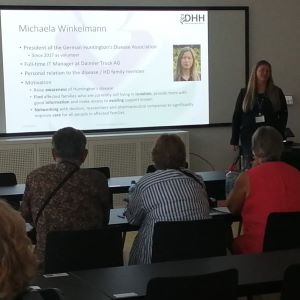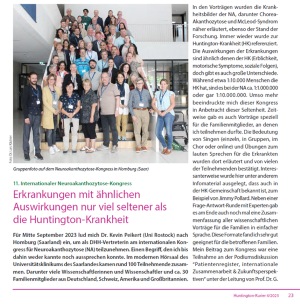 If you read our report from the most recent Symposium in September 2023 you may remember we had Michaela Winkelmann from the German Association for Huntington Support (DHH) as one of the guest speakers. She delivered an informative presentation in the patient-oriented sessions, along with an important contribution to the conversations of the panel on patient data, which was part of the scientific sessions (photo at right).
If you read our report from the most recent Symposium in September 2023 you may remember we had Michaela Winkelmann from the German Association for Huntington Support (DHH) as one of the guest speakers. She delivered an informative presentation in the patient-oriented sessions, along with an important contribution to the conversations of the panel on patient data, which was part of the scientific sessions (photo at right).
Michaela kindly shared her experience attending the symposium and her article was published in the Huntington-Kurier, the Association’s magazine, December 2023 issue – see the translation below. This is distributed to the members only. Thank you once again to Michaela and DHH for being so open and accepting towards the NA community. We hope you will find her ideas useful, and we encourage you to seek your local HD centre, if one is available to you.
 Translated article:
Translated article:
11th International Congress for Neuroacanthocytosis (NA) Syndromes – similar diseases to Huntington Disease (HD), but much rarer
Dr Kevin Peikert (Rostock University) invited me as representative of the German Association for Huntington Support (DHH), to attend an international congress for the NA syndromes in Homburg, in mid-September. NA is a syndrome that I neither knew nor could pronounce until then. Around 100 participants gathered in the modern lecture hall of the Saarland University Hospital. These included many scientists and around 30 patients and family members from Germany, Switzerland, America and Great Britain.
In the lectures, the clinical views of NA syndromes (VPS13A disease – chorea-acanthocytosis and XK disease - McLeod syndrome), were explained in more detail, as was the status of research. References were made again and again to Huntington's disease (HD).
Some of the symptoms and the effects of the diseases are similar to those of HD (heredity, motor symptoms, social consequences), but there are also major differences. While around 1:10,000 people have HD, the figure for NA is around 1:1,000,000 (VPS13A disease) or even 1:10,000,000 (XK disease).
This conference impressed me even more given the rarity of the conditions. At times there were also sessions specifically for family members, which I was allowed to attend. The importance of singing (individually, in groups, in a choir or online) and speech therapy exercises (for speaking out loud) for those affected was explained there and confirmed by many of the participants. Interestingly, information material was displayed here that is also known in the HD community, for example from Jimmy Pollard. In addition to a Q&A session with experts, at the end there was also a summary of all the scientific lectures for the families in simple, lay language.
I found these formats to be very suitable for the present patients, their family members, and carers. My contribution to the scientific track of the symposium was the attendance in the panel discussion “Patient Registers, International Cooperation & Future Perspectives” led by Prof. Dr Bernhard Landwehrmeyer. Here I was able to demonstrate the importance of the EnrollHD study to the global HD community. I also participated in a session for patients and their families titled “Learning from experiences with HD” where Dr Alzbeta Mühlbäck spoke about the multidisciplinary team in Taufkirchen (Vils) and I introduced the German Association for Huntington Support (DHH).
In discussions with the families, the wish for the NA-affected families to be able to join the regional HD centres came up several times. If NA families contact the HD representatives, it would be good to give them a listening ear. In my opinion, we can learn a lot from each other and create something together that benefits everyone.
A big thank you to Dr Kevin Peikert for the invitation, to Dr Lars Kästner for organising and delivering a high-quality and informative symposium, to the NA families for the warm welcome into their community and the knowledge and information exchange, and last, but by no mean least, big thank you to Professor Dr Bernhard Landwehrmeyer for the two sessions to connect the NA and HD communities closer.
- Michaela Winkelmann